Ever driven down a road or highway and listened to a constant hum, whistle, squeal, or burr that persists in the background of any music you listen to? Like me, are you afraid it could lull you to sleep? It doesn’t matter if you drive a luxury sedan, high-performance vehicle, van, SUV, half-ton truck, or even your Mom’s vintage hand-me-down, that sound is the sound of your tires.
Best Quietest Tire Models:
- Michelin Primacy MXV4 Radial Tire
- Goodyear Wrangler Radial Tire
- Hankook Optimo All-Season Tire
- Goodyear Wrangler DuraTrac Radial
- Michelin Defender T+H All-Season Radial Tire
- Michelin Defender LTX All-Season Radial Tire
- Bridgestone Turanza Serenity Plus Radial Tire
- Michelin Energy Saver A/S All-Season Radial Tire
- Continental Extreme Contact DWS06
- Michelin Pilot Super Sport Tire
- Goodyear Assurance ComforTred Touring Radial
We all know how to find and read the reviews on tires. Every manufacturer toots their horn that they have the best and quietest tire for the smoothest ride, but how do we know. I wanted to know what to look for when selecting a tire for my vehicle.
That luxury SUV is very different from my half-ton, so their tires aren’t my tires. What makes tires noisy, and why are some rated quieter than others? I wanted the answers. I figured others might be interested too, so I decided to share what I found.
Top 10 Best Quietest Tires on the Market Reviews
Note: Sipes are thin slits cut into tread blocks to improve traction on icy and wet pavement.
#1 Michelin Primacy MXV4 Radial Tire
Best Quiet Tires Overall
The Primacy is an all-season touring tire computer designed to decrease road noise, vibration, and fuel consumption. The Primacy is a larger tire that works well with SUVs and light trucks. Rigid tread construction helps maximized tread contact with the pavement. Twin steel belts boost speed stability, ride comfort, and durability. The computer-designed tread pattern assists in the reduction of tread noise, making for a quieter experience.
Tire Features
- Asymmetric linked large shoulder block design
- Active 2-D “Sipes” that increase grip for traction
- Tread blocks create even pressure and improved handling and stability
- Limited treadwear warranty up to 60,000 miles
Pros
- Quiet, soft ride
- Good traction on dry roads
- Good stopping on wet and dry pavement
Cons
- Not a good winter use tire
- Tread durability is an issue
#2 Goodyear Wrangler
Quietest Tires for SUV
A light truck and SUV all-season highway tire. A long-wearing product that provides a quiet, comfortable, and stable ride.
Tire Features
- All-season grip
- Large tread blocks for stable handling
Pros
- Deep aggressive treads
- Long tread life
- Good deep snow traction
Cons
- Some have treadwear issues
If you want to read the reviews or check the price, you can visit the Amazon listing here.
#3 Hankook Optimo H727 All-Season Tire
Best Quiet All Season Tires
A touring tire with computer-designed tread for a quieter comfort ride. It has enhanced all-seasons performance due to the custom rubber compound. The four grooves not only reduce hydroplaning but also work with the engineered tapered lateral slots to cancel out the noise. The Optimo has improved handling, corners well, and has one of the best warranties.
Tire Features
- Center rib for better stability
- 4 grooves to shed water and improve traction
- Lateral slots decrease noise and improve comfort and stability
- Enhanced rain and snow traction with high density siping
Pros
- Low tire noise
- Long tread life
- Good dry or wet road handling and comfort
- Corner well
Cons
- Not a deep snow or slush tire
If you’re interested you can check out the listing on Amazon here.
#4 Goodyear Wrangler DuraTrac Radial
Quiet Truck Tires
A hard-working all-terrain high traction SUV or light truck tire for on or off the road. Rugged treads for grip in mud, sand, gravel, or snow, especially when towing or carrying heavy loads. Although the stiffer treads should produce more wheel sound, the traction grooves and zigzag sipes combine to reduce air from being trapped and reducing tire noise.
Tire Features
- Treads resist chipping or tearing
- Symmetrical tread design with big shoulders and angled center blocks for traction and stability
- TractiveGroove technology in the grooves improve traction in deep snow and mud
- Rim lock prevents wheel slippage and has a built-in rim protector
- Zigzagging sipes and stepped shoulder blocks help treads self-clear
Pros
- Aggressive all-terrain tire
- Great tread life
- Smooth ride
- Excellent winter performer
Cons
- Grooves and voids hold and throw stones
#5 Michelin Defender T + H All-Season Radial Tire
Best Tires for Quiet Smooth Ride
High-speed performance tire designed for dry, wet, or light snow conditions. 5 directional ribs and 4 circumferential grooves improve wet and dry traction and help decrease tire sound. The uniblock shoulder and tapered middle rib improve control on wet and dry roads. Groove-in-Grove technology reduces wear and noise while stiffening treads for durability. The Defender has six-pitch tread variations to decrease noise even more. A smooth-riding, and quiet tire.
Tire Features
- Linked shoulder tread blocks for improved tread rigidity
- Asymmetrical tread construction with a tapered center rib for enhanced traction and comfort
- Intermediate tread blocks are independent, 3D sipes, and angled grooves enhance wet road grip
- Twin belt construction for better control, comfort, and tread wear.
Pros
- Smooth, quiet ride
- Good wet road performance
- Excellent dry road control
Cons
- Not a winter season contender
- Treadwear can be a concern
#6 Michelin Defender LTX All-Season Radial Tire
Best Tires for Quiet Ride
The Defender is an all-season touring tire. New tread rubber formulation improves durability, comfort, traction, and sound quality. MaxTouch construction and interlocking sipes improve tread block road contact for better acceleration, maneuverability, and braking. The four circumferential grooves combine with diagonal sipes to tune down the tread noise, making for a quieter ride.
Tire Features
- Interlocking zigzag sipes for improved tread rigidity
- 4 wide grooves improve traction on wet pavement
- High silica content improves wet traction
Pros
- 90,000-mile warranty
- Twin belt construction
- Excellent dry and wet handling
- Superior comfort and sound control
Cons
- Winter performance is fair
Check current price here (Amazon).
#7 Bridgestone Turanza Radial Tire
Best Grand Touring Tires
An all-season grand touring tire offers improved snow traction and fuel economy, plus better treadwear. Enhanced maneuverability and ride due to the Long Link Carbon Black tread. The manufacturer uses Resonance Noise Attenuated Silencer grooves in the tread blocks to help reduce trapped air sound. Coupled with the circumferential grooves, the tire produces little air sound. With lower rolling resistance also comes better fuel efficiency. A gem of a touring tire.
Tire Features
- Resonance Noise Attenuated grooves decrease sound for a quieter ride
- Continuous shoulder and center ribs reduce noise and improve road contact and stability
- 3 grooves reduce hydroplaning by removing moisture
- Improved handling and comfort with twin steel belts
Pros
- Dry and wet traction is excellent
- Treadwear is rated excellent
- Comfort and sound good
Cons
- Fair winter performance
- Some issues with tread wear
#8 Michelin Energy Saver A/S All-Season Radial Tire
Best Tire for Comfort and Noise
An easy-rolling tire with improved fuel efficiency, traction, and control. The silica-based rubber helps keep the tire cooler and improves handling, stopping, and traction. Lateral grooves and multiple sipes help with maneuverability and tire noise. The computer-designed Comfort Control Technology decreases road noise and vibration for a quieter drive too.
Tire Features
- Energy Saver construction has low rolling resistance
- Symmetrical independent siped tread block design improves traction, control, and stopping
- Twin steel belts for strength, durability, and comfort
Pros
- Improved fuel efficiency
- Wet and dry road performance is good
- Good treadwear
- A quiet, comfortable ride
Cons
- Snow performance is low
- Treadwear can be an issue
#9 Continental Extreme Contact DWS06
Best Low Noise Tires
An all-season high-performer with good traction, the DWS stands for dry, wet, and snow. Silica enhanced compound with +Saline additives improves tread life and wet grip. The computer-designed criss-cross tread pattern, lateral grooves, along with the three full circle grooves, combine to prevent air from being trapped, making for a much quieter ride. The Extreme Contact is a quiet, responsive, and maneuverable tire.
Tire Features
- SportPlus technology for better grip on wet pavement
- Traction Grooves improve performance in snow and on wet surfaces.
- X-Sipe technology for better maneuverability, acceleration, and braking
- Asymmetrical blocks with chamfered edges maximize road contact and traction
- QuickView helps identify misalignment issues for better tread life.
Pros
- Good tread life
- Excellent wet and dry traction
- Responsive control
- A quiet, comfortable ride
Cons
- Not a rough road or snow tire
#10 Michelin Pilot Super Sport Tire
Quietest Performance Tires
High-performance summer street sports tires that deliver handling, traction, and durability, plus improved tread life. Based on racing design successes at 24 hour Le Mans and 12 hour Petit Le Mans to deliver longevity, performance, and maximum tread wear at high speeds. The 80/20 bi-compound tread improves wet and dry handling. A spongy rubber layer between the treads and reinforcing material help decrease sound and vibration, improving the ride comfort.
Tire Features
- Asymmetrical tread design
- Low void track-type shoulders
- Notched center ribs for improved traction
- Sound absorbing foam layer to decrease road noise
Pros
- Sturdy sidewalls for tight curves
- Low road noise
- Solid grip on wet and dry pavement
- Ride quality
Cons
- Not a cold weather tire
Bonus: Goodyear Assurance ComforTred Touring Radial
An all-season touring tire designed for a quiet, smooth ride. It has increased cushioning, traction, and handling due to the ComforTred technology. ComfortEdge side walls also enhance handling and comfort. The spongy rubber layer between the treads and steel belts absorbs road vibration and noise, helping to decrease tire sound. A quiet tire and comfortable ride.
Tire Features
- Asymmetric designed tread
- Wide grooves circumferential improve traction on wet pavement
- Impact and vibration absorbing rubber layer between the belts and tread
- Dual Comfort Zones in sidewall and tread construction
Pros
- Dense tread blocks for quiet and comfort
- Good handling on dry pavement
- Excellent traction on dry roads
- Twin belt construction
Cons
- An issue with tread wear
- poor traction in wet and light snow conditions
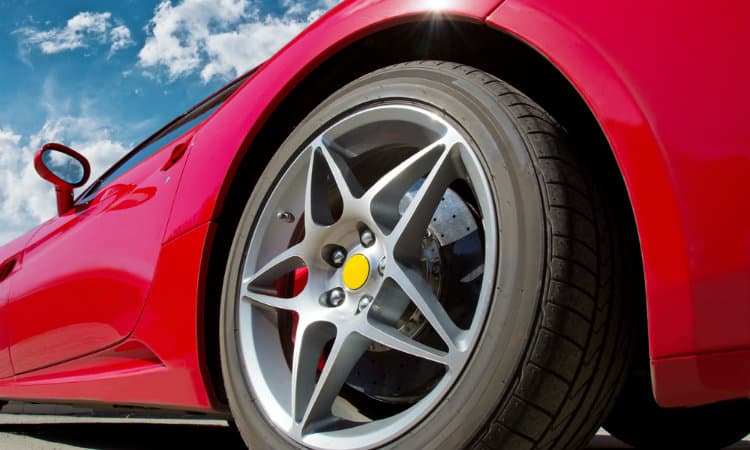
What Causes Excessive Tire Noise?
Many parts of a vehicle create noise. The engine is often the loudest, but the suspension, moving parts like doors and seats even make noise. However, the most irritating noise is often your tires.
I once had a mountain bike with knobby tires and also a racing bike with street tires. The mountain bike was great off the road, but the tires created vibration and a noisy pattern on the pavement. While the street tires gave a smoother and quieter ride. I realize that’s a “Dah” moment, but that’s my first remembrance of tire noise and how irritating it can be.
Automotive tires are no different in the noise department. There are whole teams of engineers, technicians, and designers working for each brand to improve tire grip, handling, tread life, and reduce the noise it makes. But what causes the noise?
Common causes:
Tire Size
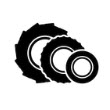 The bigger the tire, the more rubber on the road, and the more potential for tire noise. If you usually have 18” wheels, try a 16” wheel.It may not look good, but the same tire will produce less road sound.
The bigger the tire, the more rubber on the road, and the more potential for tire noise. If you usually have 18” wheels, try a 16” wheel.It may not look good, but the same tire will produce less road sound.
Alternatively, switching from a 265 to a 235 will also reduce the amount of rubber hitting the road.If you switch to winter tires on smaller rims and notice the sound increases, that’s because the tread is a different design.
Tire Tread
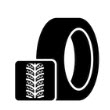 All tires produce some noise, but the less aggressive the pitch or tone, the less obtrusive to the driver and passengers. Air gets trapped in the grooves between the tread blocks and the road, causing it to compress and make noise as it escapes.
All tires produce some noise, but the less aggressive the pitch or tone, the less obtrusive to the driver and passengers. Air gets trapped in the grooves between the tread blocks and the road, causing it to compress and make noise as it escapes.
Tires with more space between tread blocks will be louder than those with less space. Additionally, the symmetrical tread pattern will produce more sound than an asymmetrical design.
Tire Type
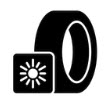 Tires are designed for different uses with different tread patterns. Winter tires have to handle snow, slush, and ice, so will be noisier than all-season tires.
Tires are designed for different uses with different tread patterns. Winter tires have to handle snow, slush, and ice, so will be noisier than all-season tires.
Tires with studs are even louder. Low-profile tires will also be louder since their sidewalls are stiffer. All-terrain tires will be more ear-popping due to tread and sidewall construction than summer touring tires.
Road Conditions
 The road surface is the keyboard for your tires. Smooth newer asphalt or concrete will produce the quietest ride.
The road surface is the keyboard for your tires. Smooth newer asphalt or concrete will produce the quietest ride.
Grooved concrete is designed to move moisture off the surface, but will create a cacophony of sound, similar to roads under repair with the top layer removed. Fresh asphalt is sticky and produces a hollower sound than the drumming of pitted or coarse pavement.
Driving Habits
 At higher speeds, the faster the tire rotation and more air traversing the tread pattern, the higher the sound. Even the air in the tire chamber can resonate like a drum.
At higher speeds, the faster the tire rotation and more air traversing the tread pattern, the higher the sound. Even the air in the tire chamber can resonate like a drum.
The heavier a vehicle is loaded also impacts sound production. Quick acceleration, cornering, and heavy breaking alter the sound your tires emit as they work to grip the road.
Driving Conditions
 Pavement temperature and the amount and type of moisture impact the tune your tires share in the passenger compartment. Hot pavement will be stickier than cold, and wet vs. damp alter the sound too. Black ice isn’t a sound you wish to encounter, as it often leads to other less desirable sounds.
Pavement temperature and the amount and type of moisture impact the tune your tires share in the passenger compartment. Hot pavement will be stickier than cold, and wet vs. damp alter the sound too. Black ice isn’t a sound you wish to encounter, as it often leads to other less desirable sounds.
Abnormal causes:
Uneven tread wear
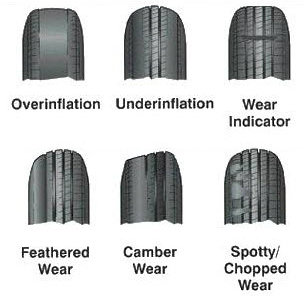 Under-inflated tires wear more on the shoulders and will produce more of a squeal.
Under-inflated tires wear more on the shoulders and will produce more of a squeal.
Over-inflated tires will wear faster in the middle treads and produce more of a drumming sound.
Camber wears more on one tire shoulder or the other and occurs if there’s an alignment (ball joint) or suspension problem.
Feathering occurs when your tire toes-in or out; an alignment, bushing, or suspension concern.
Cupping or patch wear results from damaged suspension or improper tire balance.
Improper wheel and tire maintenance
Increased sound and vibration at higher speeds.
Uneven tire wear.
Alignment issues
Cause tires to toe-in or out, camber, or caster.
Louder noise.
Tires wear individually.
Vehicle handles differently.
Tire Balancing
Balanced tires wear evenly and are quieter.
Tires that are out of balance are louder and wear unevenly.
Imbalanced tires create vibration and handling concerns.
Other Causes:
Wheel bearings
May cause a roaring sound when accelerating, cornering, or lane changing if bearings need replacing. Can cause a vehicle to pull and cause an accident as it worsens.
Hubcap lug nuts
Loose lug nuts can cause a shake or shimmy accompanied by a rattle as speed increases.
Struts
The struts are part of the suspension. If they are failing, you’ll feel more bump and vibration. The tires will also produce more sound as there is more pressure on them.
CV joints
The CV joint is the flexible section of the axle that moves with the wheel and suspension. If it is wearing out or damaged, it will make a popping or clicking sound. The vehicle could wobble, and the tires will be noisier.
Drive belt
A loose belt can cause a squeal as you accelerate or turn corners. The belt(s) drive your alternator, which charges your battery, your air conditioning to keep you cool, and the power steering, which makes it easier to steer.
Does Tire Tread Affect Road Noise?
Tire treads help your tires grip the road to accelerate, maneuver, and stop. They shed moisture and absorb road imperfections and bumps, making your ride smoother. Treads also make your tires hum like a harmonica!
Tire engineers and designers know how to make an almost silent tire. However, to make it stand up to different road conditions and surfaces, temperatures, vehicle weights, and be durable enough to start, stop and handle curves, something has to give.
As the vehicle rolls along the road, air is forced between the treads and the road surface, creating sound. The faster a vehicle travels, the higher the pitch. The aim is to find a pitch that doesn’t irritate those in the automobile.
To reduce tire noise, designers and engineers try to make treads that shed noise like they do water. Continuous ribs divided by straight grooves around the tire circumference help air escape for a quieter ride.
Each asymmetrical tread block has its own sound pitch, which tends to cancel each other out. Smaller blocks are quieter than larger ones, and small diagonal grooves in the circumferential grooves also cut the noise.
To dampen tire sound further, the designers decreased the space between tread blocks. Reinforcing the shoulders stabilized the treads cutting out some noise, and using softer composite rubber tread, makes them quieter too.
Narrower or smaller diameter tires have less rubber on the road, which also means less sound. So, while tire treads create harmonic sound, manufacturers have tried to orchestrate a less irritating concerto.
How to Quiet Noisy Tires
Different Vehicle Type and Options
The model and vehicle you drive will impact the noise you experience. A sedan is quieter than a station wagon, while lights trucks and SUVs produce more wind noise.
An electric car will generate little, if any, motor noise, so the harmonics of tires may seem to resonate louder. A convertible with the roof closed will be twice as loud as a fixed roof and even more deafening when open. A 4 cylinder will reach higher decibels at cruising speeds or when accelerating than a 6 or 8 banger.
Softer Suspension
Vehicle suspension dramatically affects the comfort and maneuverability of automobiles. When any component of the suspension system wears or fails, the noise will increase, and comfort and control decrease.
Softer suspension creates a smoother ride but affects cornering control. To counter that, anti-roll stiffeners are added. An alternative is an interconnected hydro-pneumatic system of suspension, which adjusts automatically. A well-maintained system will lessen road sound.
Acoustic Windows
The glass in your automobile can also quieten the ride. Many modern windshields have a soundproofing membrane to minimize wind sound. Others rely on thicker, heavier glass to achieve similar results. However, increased weight translates into higher fuel consumption and tire wear.
Car Accessories
Luggage racks, towing mirrors, hood protectors, and faring’s can all add to a vehicle’s musical output. Tire choice, muffler extensions, and window deflectors also contribute to the orchestra pitch. If it negatively affects the relaxing ride, consider changing or removing the accessory.
Driving at Slower Speeds
A lead foot makes for a noisy ride. Engines, tires, and accessories make softer or less music at lower speeds. Your fuel consumption is also usually better at lower momentum.
Keep Tires Properly Inflated for a Quieter Ride
Overinflated tires will make a drumming sound as the speed increases and wear more in the middle treads. Underinflated ones will squeal and show greater wear on the shoulders. Both will negatively influence tire life, handling, and fuel consumption.
Change Tires When Needed
Rotating wheels and replacing worn tires will improve ride, sound, and tire life. Rotation is recommended every 5 to 8 thousand miles. Checking treadwear during rotation will also identify any other potential problems with alignment or suspension.
Wheel Alignment
Tire sound will increase if wheels are not correctly aligned. Improper alignment also affects tire life, fuel consumption, ride comfort, and driver control.
Keep Wheels and Tires Properly Maintained
Maintaining your tires includes rotation, balancing, alignment, air pressure, and ensuring lug nuts are tight. Driver and passenger comfort and safety hinge on well-maintained tires. Monitoring their wear will help identify other potential issues and stretch out your tire investment.
Buying Guide to Choose the Best Quietest Car, SUV, and Truck Tires
Here are some helpful hints for selecting quiet tires that can provide you with a quieter and more comfortable driving experience.
Tire Types
Passenger vehicles:
- Summer Touring are usually the quietest and are great in warm weather, but not in the cold.
- All-Season Touring are not as quiet as the Summer but provides a more comfortable ride. It gives up some wet pavement traction for better winter grip.
- Performance tires create less sound at higher speeds and have a better pavement ride.
- SUV Highway tires provide good treadwear, traction, and ride comfort. They are noisier than a touring and performance tire.
- Winter and Studded Winter tires have treads that work better on snow and ice, with a more pliable rubber compound for freezing temperatures. These seasonal tires are generally noisier than most other passenger tires. They don’t stop as fast on dry pavement as an All-Season. Studded are also louder than studless winter tires.
Light Trucks and SUVs:
- Highway Touring are the quietest and provides the most comfortable ride. They are stiffer and thicker than passenger vehicle tires, so they will be louder.
- All-Terrain have larger voids between tread blocks which make them noisier than highway tires.
- Studless Winter tires fall in the middle of the light truck tire noise spectrum. They are more pliable at cold temperatures, but also louder.
- Mud Terrain have the largest voids between treads for traction, which also make them noisy on hard-driving surfaces.
- Studded Winter tires are the noisiest product, but they are designed for traction and heavier loads, not cruising with your windows down.
What the Sidewall Numbers Mean
LT265/75-R18 108S P205/50-R16 91V M130/70-R18 63H
The three examples give a lot of information about the tires they represent.
- LT represents Light Truck, P identifies passenger vehicles, and M for motorcycles; ST is for a trailer, and T means temporary.
- 265, 205, and 130 is the width in millimeters
- 75, 50, and 70 are the Aspect Ratio, comparing the tire width to the sidewall height, so the sidewall height is 75%, 50%, and 70% of the width of the respective tires.
For example: 265×0.75=198.75mm
- “R” represents radial tire construction, meaning the layers or plies follow the circumference of the tire. Most tires today are radial. A “-” or “D” is a bias-ply of diagonally criss-cross layers and is the oldest type still in use. The letter “B” means bias-belt, with the layers overlapping diagonally with an extra belt running the circumference.
- The number following the “R” identifies the diameter of the rim, in inches.
- 108, 91, and 63 is the load index. 108 means 2205lbs, 91 is 1356lbs, and 63 translates to 600lbs.
- The last letter is the speed rating. S = 112mph, V = 149mph, H = 130mph. Other letters represent other speeds.
Treadwear
Treadwear is normal, but excessive or unusual wear will increase disturbances to the driver and passengers. Such wear usually indicates other issues of concern that should be checked.
Wheel Size
The smaller diameter will have less rubber in contact with the pavement, so should reduce noise. The less rubber means less air trapped in the treads and less noise. The owner’s manual is an excellent way to identify the correct choice.
Tire Width
The narrower the tire, the smaller the area of rubber on the road, and the quieter the ride. The vehicle manual has information on the proper dimensions for your ride.
Tire Materials and Patterns
Tire patterns and rubber compositions vary from manufacturer to manufacturer and for different regions. Independent noise ratings tend to be more accurate than those done by the brand but may not take into account pavement peculiarities in your area.
Softer compositions of rubber may be quieter but negatively affect fuel consumption and maneuverability. Do your homework and talk with local tire dealers, they often have a better knowledge of local road noise ratings than anyone else.
Speed and Weight Specifications
Tires are rated for maximum speeds, so if most of your driving is on freeways, buy a high-speed product. Check the weight ratings too, tires with heavy load ratings are stiffer and harder, making them louder, as will high-speed cruising.
Road Conditions
The pavement in different areas is not the same. Asphalt surfaces may be smooth, rough, or pitted depending on the type of aggregate used, the amount of sand, and if recycled blacktop was used.
The ride and tread harmonics on high-volume highways will differ from residential arteries and side streets too.
Weather Conditions
Select the product that will handle the weather your region receives. If you’re in a snow belt, studless are recommended by most insurance companies. They may be noisier than touring tires but handle the cold better.
Many areas prohibit studs, preferring chains for heavy snow. The more flexible rubber compound of cold season tires doesn’t handle hot summer pavement, so it should be changed seasonally.
Best Quiet Tire Brands (Who Makes What?)
There are many moving parts on a vehicle that adds to the orchestra of sound, but only your tires touch the pavement (normally). They provide grip for acceleration, maneuvering, and braking. They cushion the ride and keep those in and out of the vehicle safe.
Here are some of the major tire manufacturers competing for your business.
- Goodyear was founded in 1898 and is a US product; they also manufacture other brands like Dunlop, Goodyear, Fulda, Falken, Kelly, and Douglas.
- Michelin was started in 1889 and is presently the largest manufacturer. It is a French company with plants in over a dozen countries, including the USA and Canada. It also owns B.F. Goodrich, Kleber, Riken, and Uniroyal USA.
- Bridgestone was created in 1931 and acquired Firestone (1900) in 1988. They make tires in 25 countries at over 180 factories. Makes Bridgestone, Firestone, Daytona, Europa, and Fuzion tires.
- Hankook is a South Korean company begun in 1941. It fabricates tires in S. Korea, USA, Germany, and China.
- Yokohama started in 1917 in Japan as a joint venture with BF Goodrich. They have had plants in the USA since 1969. ADVAN is one of their aftermarket brands.
- Continental is a German-based company with roots reaching back to 1871. They have 73 facilities in 42 countries, making Continental, Uniroyal (in Europe), Viking, General, Gislaved, and Semperit, among others.
Tire Noise Rating Chart
Related Questions
Will Undercoating Reduce Road Noise?
Applying a rubberized undercoating, especially on a new vehicle, will reduce road noise, and prevent rust. It should be repeated yearly to continue to be effective.
Do New Tires Need to be Broken in?
Tires need to be driven on dry pavement a couple of hundred miles to be broken in. Production lubricants need to be worn off so tire components can interact. Once the treads are slightly roughened, they’ll grip better, and you’ll know your tire is broken in.
Are Wider Tires Quieter?
Wider tires have more rubber on the road, so are louder. High-performance tires have a softer compound which is noisier. Trucks have aggressive treads with larger voids that make more sound, and dedicated snow tires combine more pliable rubber to grip cold or icy roads and wider voids to clear snow.
Related posts:
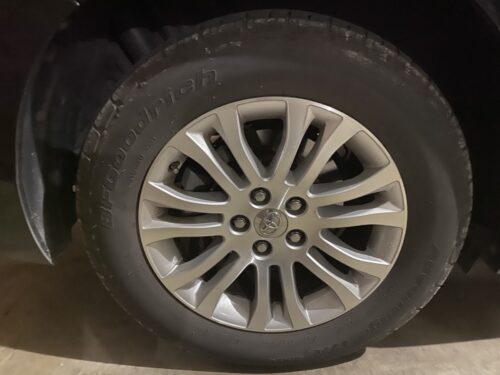




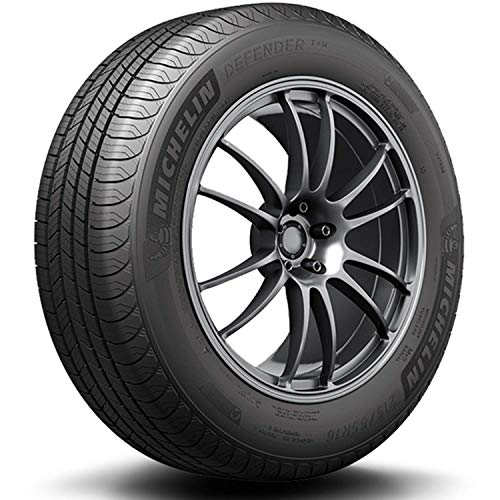
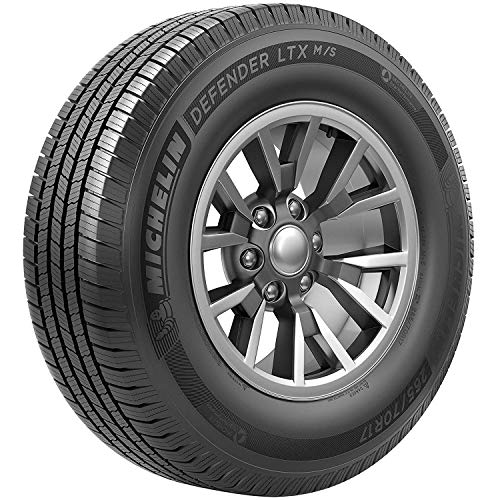





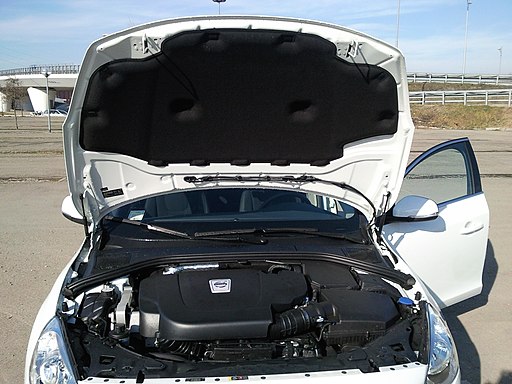
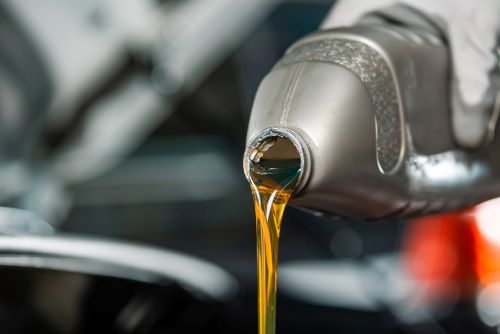
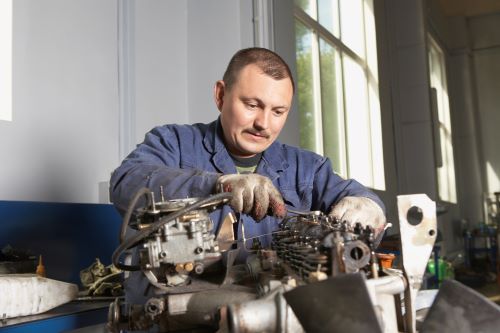

Hi Eugene! I am so glad that you took the time to write this excellent piece. I’m not sure why truck manufactures don’t give more consideration into creating a quiet ride. After about a month of searching for a truck to replace my 200 Ford Ranger, I settled on the 2019 Honda Ridgeline. The larger trucks like the F150 and Dodge Ram were the quietest but I didn’t feel as though we needed a full-size PU, so, after driving the Colorado, Canyon, Tacoma, and new Ranger, I ended up with the Ridgeline. The cabin is pretty quiet in every way except for some unwanted tire noise. The factory tires are Firestone Destination LE2 tires 245/60R18 105H. I know it sounds crazy buying new tires so soon, but I am considering putting on a new set to make the truck as quiet as possible. I live in Ohio and winters are mild. I do not tow anything nor haul much in terms of weight. The truck is mainly for around town and highway travel on business trips and to cycling destinations. Which tire from your list do you think is my best bet for the quieter tire possible? Lastly, would you consider undercoating the vehicle (or at least the wheel wheels)? — Michael
Everyone knows the Goodyear Wrangler line is one of the loudest on the road. BFGoodrich KO’2 are a far superior. they last longer preform better and you can barley hear them, even in a 10 ply.
I have tried googled durability rating against quiet tires, but could not find anything.
Do you have a top 10 tires in terms of durability, but ONLY of quiet rated tires?
my car is BYD S7 2018 have Michelin pilot sport 3 tyre 235 55 r18 temp A ,traction A ,treadwear 320 .if I got same but treadwear higher that 320 is the noise increased and effect to comfortable
Very good overview of tire noise and causes. I learned a lot from the hard work you put into compiling the information.
Thank you
George Ralls
[email protected]
If you do an article on best way to reduce cabin noise, I would be very interested.
Hi George,
We have an article on soundproofing a garage and shed, but no cabin yet. Glad you enjoyed the article.
Terry
If you cover the inside of the car with egg trays, it reduces the cabin noise. You’re welcome
Hi John,
You must have missed my article on Egg Crate Soundproofing. Next time I see Porky the Pig flying over the house, I will give it a try. But thanks for the suggestion.
Terry
What is the most comfortable tires for 2002 Lexus SC430. After 4 back operations This little sports car is impossible ?
Excellent review. I learned a lot from your article. Well written and very informative.
Glad you found it helpful.
Terry
Great information! I’m in So. Florida. In your opinion, which would be quieter for my Murano, Michelin’s Grand Touring All-Season Primacy Tour A/S OR Continental Crossover/SUV Touring All-Season Cross Contact LX25?
Hi Julia,
Glad you liked it.
Terry
The NOISE rating chart is not working. Sure would love to see it as I’d love to see best comfort tire for a 2013 Lincoln Navigator (in Florida).
Eugene, thanks for all the information. Been driving for over 60 years and obviously have replaced many sets of tires on many different makes of cars. During this time I’ve spent far to much time studying, researching, and changing so many tires I can’t even begin to pick one brand or type of tire over the other from all season, performance, snow or whatever nomenclature manufactures use. A long time ago I even purchased a set of tires that didn’t have any tread. I think they were by Esso oil co.?
Personally, my final conclusion for tire selection based on noise is a waste of time for most if not all applications other than the obvious like snow tires in summer. And the reasoning for this conclusion is very basic, every road surface you drive on is different from the other creating different conditions for the tires that are constant in their design along with your vehicles suspension design that is a compromise of safety and cost by the manufacturer.
I have a question. I’m looking at a new Ford Bronco sport. Great 4×4 but very stiff ride and lots of road noise. Which tire or tread design would be best to give it a better ride and quieter everyday city travel. Your opinion would be incredible.
Thank you and great job on your research and articulate post.
Great article.The detail and the thorough explanation made it easy to understand. The logic of tire design and their relationship to noise came in and was heard clearly as “4 ×4”.
Thank you.
Hi Ron,
Good to hear the article was helpful.
Terry